The United Nations climate change conference, COP27 summit, which takes place this year in the city of Sharm el-Sheikh in Egypt, is attracting media attention to climate change- related topics. At Kantar we review public opinion surrounding the event and what it means for businesses and brand owners.
We found U.N. climate talks are gathering more awareness: globally, 2 out of 3 have heard of COP 27. That said, real familiarity with the event is limited to a third of populations with disparities across countries. In the UK, which hosted COP 26, 51% of Britons say they have a good understanding of what the conference is about. This figure reduces to as low as 13% in Australia.
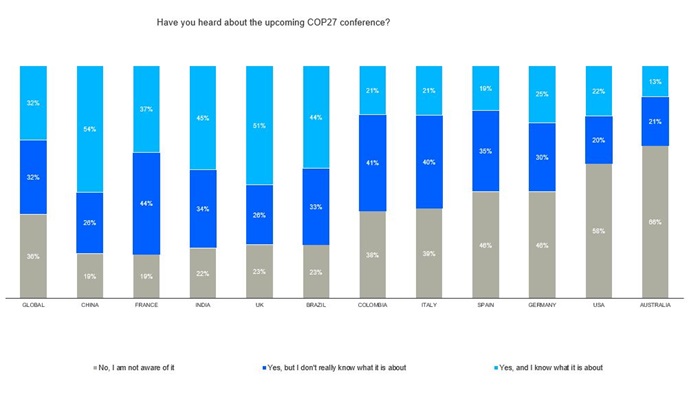
If a majority think COP 27 will contribute to moving the dial in the right direction, only 22% globally believe that the event will lead to significant progress in tackling climate change. So, should businesses and brands pay attention to it?
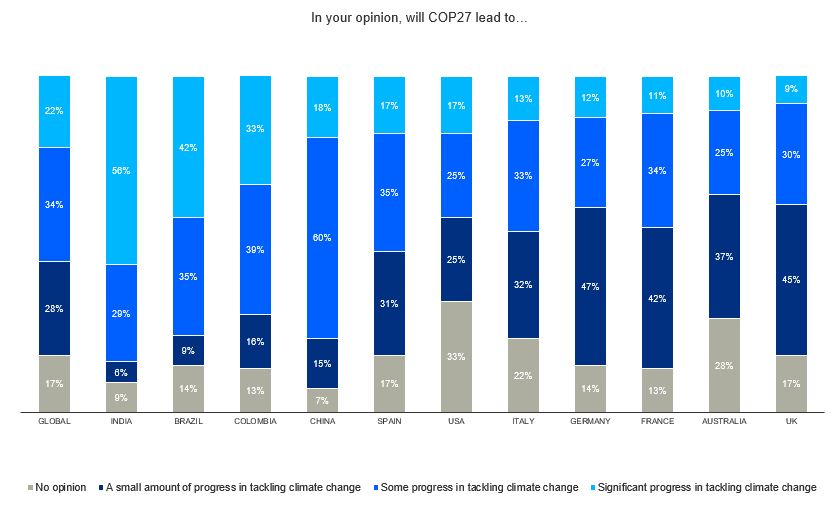
Of course, COP 27 matters to businesses because the agreements made in Egypt will cascade down into national targets, laws, regulations and policies, of which they will need to be compliant. But it is also a key moment to consider the public opinion surrounding the event.
An overwhelming majority of the public, 86% globally, agree there is a need for urgent action to address climate change. So, the low familiarity with the event should not be mistaken for a lack of interest and sense of urgency in solving for climate issues.
And the more awareness and familiarity there is with the COP 27, the more people believe that significant progress can be achieved. That is probably linked to the firm belief that a global, collective, and concerted action is extremely or very important to tackle climate change, as 80% say globally.
And within this strong sense of shared responsibility to solve climate issues, businesses have a key part to play, as 64% of the public holds them accountable for helping to tackle climate change. In fact, across the range of disruptive forces the word is facing, the public allocates businesses’ greatest responsibility on climate change, according to our Global Issues Barometer.
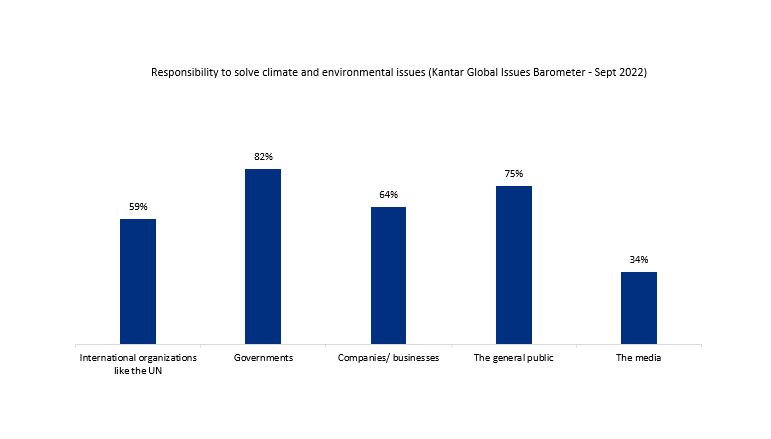
With the tagline “Together for implementation”, COP 27 is being positioned as the summit to turn ambition into action. What are people’s views on the level of ambition and actions set so far by businesses to drive the climate agenda?
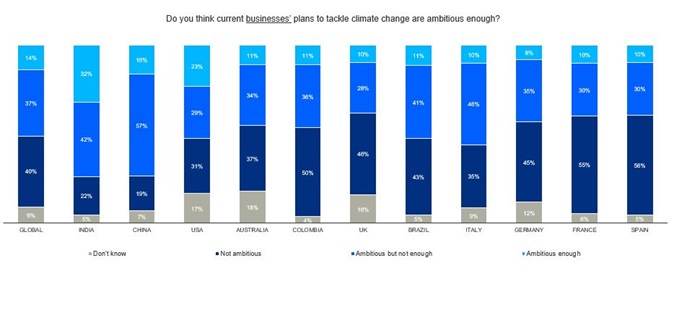
Although we note an increasing number of commitments from leading brands, the public’ opinion is that broadly climate pledges are not ambitious enough. 77% say that businesses’ plans to tackle climate change are either ambitious but not to the scale of the challenge or they are not ambitious full stop. There is a clear desire to see more leadership and initiative from the corporate world.
Similarly, if a majority recognise that efforts are being made to move in the right direction, they are not enough. Only 12% are firmly in agreement that most businesses are taking strong actions to tackle climate change and 38% think that they are worsening it. An alarming result.
Of course, although views of the corporate world look bleak, perceptions differ at a brand level and need to be reviewed, in order to understand the risks and opportunities that this macro shift creates. At Kantar we know from other work that it's those businesses that act in a credible, authentic and meaningful way that will be rewarded.
That’s why business and brand owners should pay attention to COP 27 as it will raise further awareness and continue to mobilise around this topic. Whether it is about COP 27, businesses or governments, people have expectations for a bolder and quicker transformation. Corporate and brand leaders can turn what could be risk exposure to new laws and regulations, into the opportunity of a decade: offering people a pathway to a greener life.
COP 27: How can brands create a way forward?
The need for action is clear, but the action agenda for brands to make a real impact fast remains challenging. So how to define a way forward that will ensure strong engagement around these issues?
Any outcomes of COP 27 could lead to major changes in our everyday lives. People show some preparedness for that, probably because the cost of inaction is becoming increasingly tangible and real to them. Nearly everyone, 93%, globally has a view on the consequences of climate change.
The top 3 perceived consequences of climate change are:
- Natural resources crisis leading to shortages (e.g. food, water, energy, minerals)
- Loss of nature and animal life
- Pollution affecting our health
We note some regional differences in the risk we face from climate change. For example, 43% of Europeans emphasise for loss of human life and 56% of Chinese dread the apparition of further infectious diseases.
Turing to solutions, out of the themes at the heart of the COP 27 agenda, 63% of people chose renewable energy and energy transformation as a topic that governments and businesses should tackle most urgently. Other priority COP 27 themes according to the public include sustainable water resource management, adaptation & agriculture, biodiversity and decarbonisation.
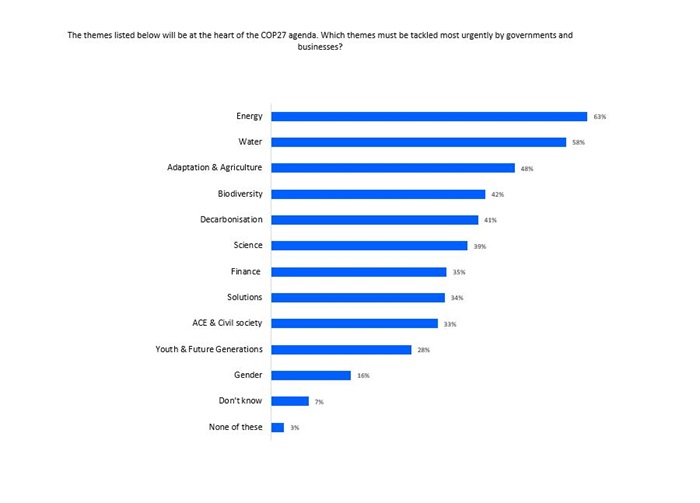
What does this mean for businesses?
Climate change is getting personal and as such it has the power to increasingly factor into people’s decision making. This shouldn’t be ignored. To stay relevant and meaningful businesses should stay close to the topics people worry and care about to mitigate risks and offer solutions to evolve the way we consume things. The way to go to unlock the sustainability opportunity differ on a sector basis: businesses need to think about where and how they have a right to play.
A new consumption culture is emerging, and brands must think or re-think how they create value. A sustainable business model is not the model we were taught in school or that we have been rewarded to build in our careers. It requires new perceptions and new ways of thinking and operating. It is challenging but optimistic. Because the future is sustainable. Brands that continue to operate in the old way are going to be left behind.
- Get in touch to learn more about the Progressive Business Model for companies wanting to advance the SDG agenda based on Kantar’s Sustainability Sector Index Study.
- And join our upcoming Global Issues Barometer Webinar: ‘Under Pressure - What marketers need to know now for strategic planning’ to hear more about the place of climate issues in the broader context of people’s lives.
About Planet Pulse
Kantar’s PlanetPulse powered by Profiles is a weekly global spotlight on people’s views on the social and environmental issues of the moment. Within this, we explore how to drive progress and sustainable solutions forward.
The survey was carried out online between 2-6 November 2022 and covered 12 countries: Egypt, USA, UK, Spain, Italy, India, Germany, France, Colombia, China, Brazil, and Australia. We interviewed 4800 people in total, that’s 400 national representative interviews in each country.



